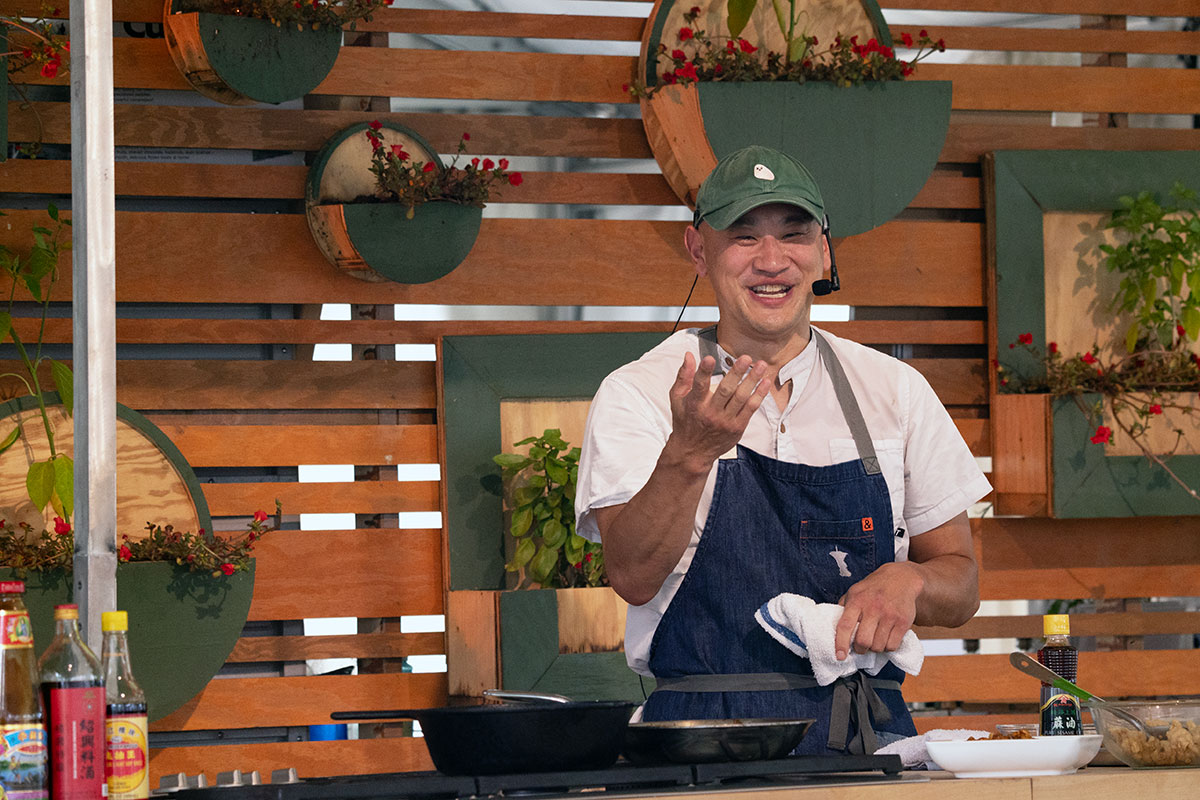With Love and Dumplings: Chef Tim Ma on Chinese New Year and the Power of Food

Chef Tim Ma leads a cooking demonstration in the Festival Foodways tent during the 2023 Smithsonian Folklife Festival.
Photo by Sonya Pencheva, Ralph Rinzler Folklife Archives
Chef Tim Ma took a bite of the Chinese New Year dumpling he made at the demonstration kitchen of the 2023 Smithsonian Folklife Festival. Despite the summer rainstorm, he made the tent feel homey, telling me about his family and how dumplings were a personal staple during the holiday season.
An acclaimed chef who takes pride in the creative twists he gives familiar dishes he grew up with, Ma owns a group of award-winning restaurants in the D.C. region, including American Son and Lucky Danger. His first D.C. restaurant, Kyirisan, won the Michelin Guide Bib Gourmand Award and held an annual spot in the Washington Post’s Best Restaurants Dining Guide before closing in 2019. Today, he is the culinary director for the restaurant and packaged-food company Laoban Dumplings, which holds a special place in his heart. For Ma, dumplings are not just a Chinese tradition but a family one as well.
“Growing up, we would make dumplings every Sunday, and we would just sit around and make the dough, the filling, wrap the dumplings, cook the dumplings, and repeat,” he reminisced.
Dumplings are a significant part of culinary China and date back to the Eastern Han Dynasty (206 BC). Many eat these little pockets of comfort on New Year’s Eve to help bring their families good luck. Some say restaurant owner Huang Mingxian of Shanghai first invented xiaolongbao (soup dumplings) nearly 150 years ago to surprise his guests. Now, like Ma’s family, many Chinese families create dumplings from scratch as it’s a wonderful bonding activity, a way to start the new year feeling connected and surrounded by loved ones.
[See a recipe for New Year’s dumplings from the 2014 Folklife Festival’s China program]

Ma and I spoke as the patter of the rain against the tent grew louder and louder. I soon realized that many of his favorite memories surrounding food were not about the its quality but rather about how the experience of sharing food brings people together. A particular dish that he remembers fondly is his family’s chicken agar salad—one that he continues to serve in his restaurants. In a true chef fashion, Ma quickly listed the ingredients: chicken, cucumbers, agar, and then some simple sauce. As the dish has been passed through generations from his grandparents to his kids, it is intertwined with a mystical familial history that brings about a feeling of connection from present to past.
Despite all the awards, Ma doesn’t lose sight of what food means to him. “Using food not just for running a business but for affecting change that helps others really shows us how to harness the power of food.” Ma’s food philosophy can be seen through his work with local charities and World Central Kitchen.
At the beginning of the pandemic, a shroud of uncertainty fell worldwide. At the time, Ma was the executive chef at American Son at Eaton, and he recalled telling his staff excitedly, “The World Central Kitchen actually called us!” Ma transformed from a chef to a kind of first responder, turning his kitchen into a place where WCK could source meals for those left hungry. When Russia’s war in Ukraine began, he raised thousands for WCK to feed displaced Ukrainians.
Responding to news reports of violence against Asian Americans, Ma started his own nonprofit with Moon Rabbit’s chef Kevin Tien, Chefs Stopping AAPI Hate. Since its founding in the spring of 2021, the organization has raised thousands of dollars for organizations fighting anti-Asian racism. Together with other chefs, the organization shows how food serves as both sustenance and a means to celebrate and build community.
As we talked, we time-traveled back to his childhood in Arkansas through his remembrances of Chinese New Year celebrations.
“I used to go to the fire station or one of those community centers that had parties where everyone had these banquet foil trays full of food,” he described. “Then the lion dance would come through and everyone would get the red envelope. I still have very fond memories of that.”
Ma cherishes the feeling of communal intimacy that is shared over food and the special occasion of the Lunar New Year. His expression softened as he recalled his uncle, who owned a traditional Chinese restaurant he spent much time in as a child.
“I’ll always remember my uncle’s Thanksgiving. It was this huge gathering with the family that would only happen once a year, and we would eat food and drink, play poker or mahjong.”
Ma wants to create the same atmosphere and memories for his children.
“It’s the same way I grew up,” he said. “You gather around the dinner table to bond over your day which still holds true with my kids. Maybe we’re a little bit busier, so maybe we will eat a meal at one of my restaurants rather than the home dining table, but it’s all the same.”

Mioko Ueshima is a former intern at the Center for Folklife and Cultural Heritage and a current senior at Georgetown University majoring in American studies with a minor in Japanese.

